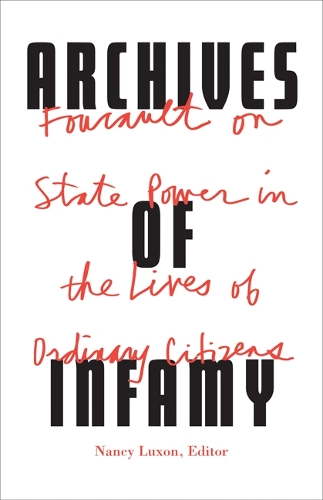
Archives of Infamy: Foucault on State Power in the Lives of Ordinary Citizens
(Paperback)
Available Formats
Publishing Details
Archives of Infamy: Foucault on State Power in the Lives of Ordinary Citizens
By (Author) Nancy Luxon
Translated by Thomas Scott-Railton
Contributions by Roger Chartier
Contributions by Stuart Elden
Contributions by Arlette Farge
Contributions by Michel Foucault
Contributions by Jean-Philippe Guinle
Contributions by Michel Heurteaux
Contributions by Lynne Huffer
Contributions by Pierre Nora
University of Minnesota Press
University of Minnesota Press
19th February 2019
United States
Classifications
General
Non Fiction
Political science and theory
Western philosophy from c 1800
320.01
Physical Properties
Paperback
400
Width 140mm, Height 216mm, Spine 51mm
Description
Expanding the insights of Arlette Farge and Michel Foucault's Disorderly Families into policing, public order, (in)justice, and daily life What might it mean for ordinary people to intervene in the circulation of power between police and the streets, sovereigns and their subjects How did the police come to understand themselves as responsibl
Reviews
"Listening to the voices rising from the archives, grasping the distant echoes of confrontations with power, exhuming the tenuous grain of tiny existencesthis is what Michel Foucault chose to do. Does the philosophers gesture conflict with the historical understanding of archival material This look back at an exciting debate asks: is it possible to build together a concern for anonymous lives, a literary passion for documentary fragments, and the desire to make a history of the discourses and practices of power"Judith Revel, Universit Paris Nanterre
"The book should be of interest to Foucault scholars, political scientists, historians of eighteenth century France, as well as general readers."Foucault Studies
Author Bio
Nancy Luxon is associate professor of political science at the University of Minnesota. She is author of Crisis of Authority: Politics, Trust, and Truth-Telling in Freud and Foucault and editor of Disorderly Families (Minnesota, 2016).
Thomas Scott-Railton is a freelance FrenchEnglish translator. He translated Disorderly Families by Arlette Farge and Michel Foucault (Minnesota, 2016).
